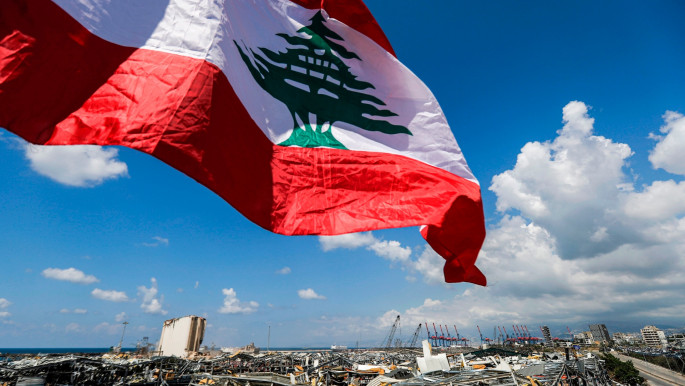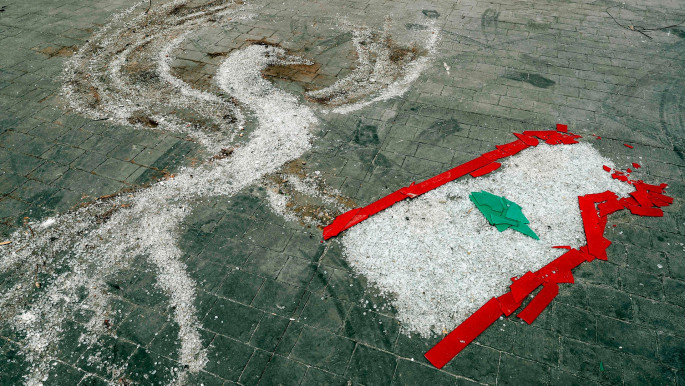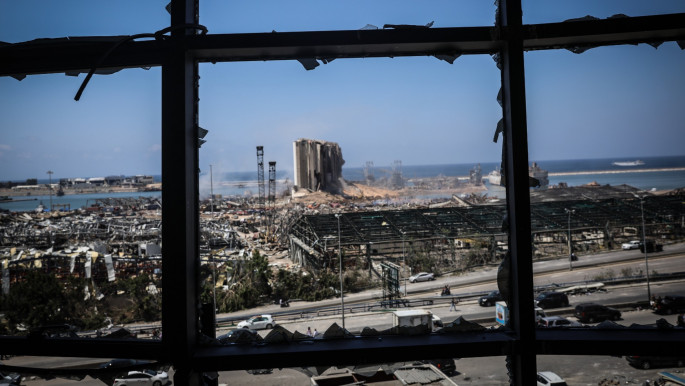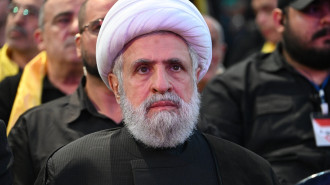After Beirut blast, mental health is Lebanon's next crisis
The blast also sent psychological shockwaves through the city, generating widespread trauma within a population all too familiar with recurrent conflict and political crises.
"We have lived war, we had Covid-19, the revolution, a terrible economic crisis, and then the explosion happened," Sabine Choucair, a storyteller and performer, told The New Arab.
"It's everything that has been building up, people have nightmares. It's always the same stories you hear from people, they have constant fears, they keep the windows open at night because you never know, right? People want out."
A topic rarely addressed since the end of a 25-year civil war in 1990 that killed around 120,000 people and destroyed thousands of homes, mental health is now a major source of concern for many doctors, NGOs, civil society groups and carers looking after relatives.
Several civil society initiatives have been launched to tackle the looming mental health crisis, including free consultations by psychologists and psychiatrists via Beirut Disaster Relief, an app set up to facilitate donations, services and volunteering online.
 |
We have lived war, we had Covid-19, the revolution, a terrible economic crisis, and then the explosion happened |  |
One such group listed on the app is Beirut Explosions Emotions, a rapidly growing operation created by 20-year-old university student Angela Lynn. The goal is to assess mental health needs through direct contact and put people in touch with the most suitable free medical care. They also post trauma-related tips on social media, and host live Instagram talks with therapists on specific topics, like how to talk to your children about what happened and the physiological signs of trauma.
"I live a bit far from Beirut but the day after the explosions, I was very frustrated not to be able to help on the ground," Angela Lynn told The New Arab. "My parents are elderly so I couldn't risk catching the coronavirus. Instead, I just created the social media account of Beirut Explosions Emotions and I talked to my teachers about my idea, it just started like that."
 |
|
| Read more: Between tragedy and hope: Survivor's guilt in the Arab diaspora |
The group have launched therapy sessions consisting of around six people, with over 30 participants signing up so far. A further 20 people have requested individual therapy. "What surprises me is that people are so open about it now," Lynn said.
"They talk to us about their mental health, they thank us for the tips. I don't think it was like that in 2006 [during a 33-day war between Israel and Hezbollah]. If we can avoid a new trauma cycle, like with people from the civil war and from 2006, then we will have done something good."
For Beirut's mental health professionals, the challenge is also personal, since they and their colleagues are going through their own trauma.
The Institute for Development, Research, Advocacy and Applied Care (IDRAAC) started working on mental health, trauma and PTSD in 1982, while the civil war was still going on. They collaborate closely with psychologists and psychiatrists working at Saint George Hospital in Beirut, which was largely destroyed during the blast, through their sister organization MIND.
Dr Elie Karam is an adult psychiatrist working with MIND at Saint George Hospital. At the moment of the blast, he was not there but his wife, a doctor, was. "My wife was injured but she's fine now," he told The New Arab. "I rushed back to help, but it was gruesome. We lost so many patients, and also colleagues. I couldn't help the people, there was no electricity or material. We've been bombed in the war but nothing like that, of that magnitude, it is impossible to comprehend."
 |
It's always the same stories you hear from people, they have constant fears, they keep the windows open at night because you never know, right? |  |
IDRAAC is training psychologists and students to provide mental health treatment and has created a free walk-in clinic and a hotline reachable 24/7. "Most of us are specialised in war trauma so that helps," Karam said. "We've been on daily communication since the explosions, through group and personal calls, we're really there for each other."
What he noticed with patients, so far, is a lot of acute stress disorder signs, like feeling distant, confused or lost, having flashbacks, sleeping issues and fear. According to Karam, the worst part usually comes after about two weeks, when the depression will set in. "In the meantime, helping is a nice feeling, as well as keeping busy and communicating with fellow people," he said.
This is also what is helping Sabine Choucair with her sadness and anger. Founder of the theatre company Clown Me In, specialised in helping vulnerable communities in Lebanon and the rest of the world, she gathered her group after the blast to help clean the streets and raise money for the most affected families.
 |
|
| From helplessness to helping out: How Lebanon's diaspora is responding to the Beirut blast |
They are now working on a show that they will start performing on 7 September for affected families, and will start psychosocial support activities a week after. "Everyone needs laughter, including us," Choucair said.
"We've been rehearsing the show, we had to change it because of the pandemic as we'll be using masks. At the beginning, you should have seen us, we looked so depressed! Today was our fourth day of rehearsal and I feel so much better," she added.
"It helps us before we can go help other people. It's simply what happens when you're supported by a group of people. But we're OK because we're being active and don't think too much. Once we'll slow down, it's going to hit us hard. I'm not looking forward to that."
Clown Me In will focus on is children, who have been badly impacted by the blast. "Some friends' children ask them 'Why are we still here? Can't we leave?', it's heart-breaking," Choucair said.
 |
We've been bombed in the war but nothing like that, of that magnitude, it is impossible to comprehend |  |
Himaya, a local NGO founded in 2009 to help protect children, have established a hotline and set up different teams, some providing recreational activities for the children and others composed of social workers and psychologists to assess needs, while giving information on TV and social media on how to deal with children affected by the situation.
"Most of the children we are following up with are presenting difficulties in sleep, fear of re-experiencing the blast, the same sound or even another 'danger'," Nivine Geagea, resilience program coordinator at Himaya, told The New Arab.
"Other children were expressing in different ways, such as aggressive behaviour. Some of them showed fear of frequenting the same place where they were present during the blast, by avoiding entering their room for instance. A few children whose parents suffer from physical disability felt responsible to save their caregiver in the moment and make sure of their safety afterwards. During playing, younger children were simulating the sound they heard from the blast."
 |
|
| Impact Lebanon: How a former WhatsApp group evolved into leading the global appeal for Beirut |
But the teams also noticed something positive emerging from the situation. "On the family level, we observed an increase in cohesion and solidarity in some families, children and caregivers are spending more quality moments together."
For adults, it may take more time to be able to address the shock. Most people have still not come to terms with what happened, such as Lily Abichahine, a lawyer who lives in Hamra, in the western side of Beirut.
"I don't remember much of the first week, then I felt very guilty," she told The New Arab. "I changed my plans and wasn't where I was supposed to, which is probably in the areas the most touched by the explosions. I should have been jogging towards the port, or eating a snack in Gemmayzeh, or visiting a friend in Mar Mikhael. Instead, I ended up having car troubles in the mountains above Beirut, and being helped by a friend, which led me even further away."
"Instead of me, it's my mother who saw the apartment falling on her, I got her crying on the phone right after it happened," she added. "My sister was at Hotel Dieu hospital for a medical appointment and I have no idea of the horrors she saw. She had to walk back to Hamra on her own and saw plenty on the way. She had to consult last week because she gets panic attacks now. You really see that the people from your family live through it very differently than you. These past two weeks have been a fog, I can't focus or do anything, but you have to."
Being able to go on and be active seems like another way to cope for people in Lebanon, yet again touched by another tragedy. "I used to joke, with every new problem we're having: 'what's next?'" Abichahine said. "I can't do that anymore."
Florence Massena is a freelance journalist based in Norway after six years spent in Lebanon. She reports on the environment, women's issues, human rights and refugees in the Middle East, Africa and Europe.
Follow her on Twitter: @FlorenceMassena





 Follow the Middle East's top stories in English at The New Arab on Google News
Follow the Middle East's top stories in English at The New Arab on Google News


